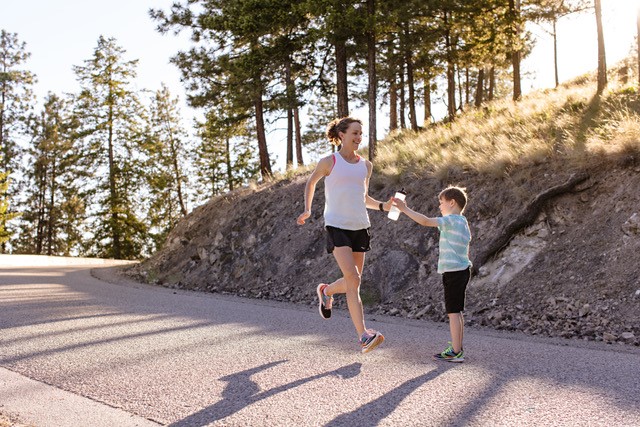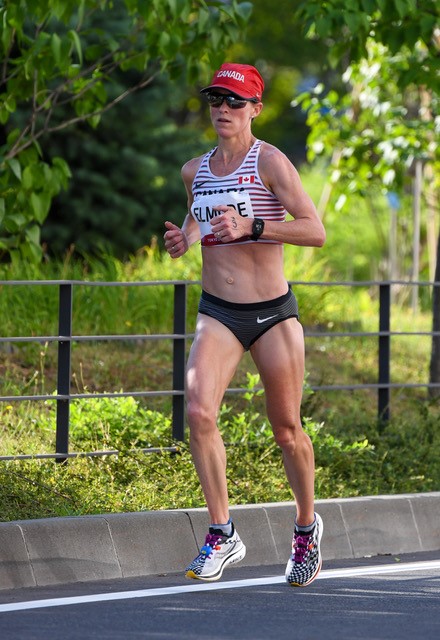Malindi Elmore
“You are the runner, right?” people sometimes ask me when I first meet them. I always answer along the lines of “yes, I love to run”, but prefer to avoid the restrictive term “runner”. I see running as something I do – something I have done most of my life with great joy. But I don’t see myself as simply a “runner”. Running is something I love to do, something I am good at and something that has provided me a life rich in travel, personal growth and relationships. Running has also provided me an education, financial means and public recognition. It’s easy to identify as a runner when it is a major part of your life and livelihood, and when it’s how many people define you. But I don’t see it that way at all. I am more than that, and I work hard to keep my identity as a person separate from my identity of what I do.
I started running when I was a little kid. I wasn’t serious about running until my mid-teens, but as long as I could walk, I preferred to run. The first time I realized I was good at running I was about 6 or 7 years old and I was running home from checking the mail. Our house was about 300m downhill from the mailbox and I would race home as fast as I could because I found the feeling exhilarating. I felt like my feet never touched the ground and that I was as close to flying as a person could ever be. I remember asking my dad about it – was this normal? Did other people feel this way running? My parents were never ones to over-inflate their praise or exaggerate our potential, however, I remember my Dad saying very solemnly, that I “had a gift” and I should take care to use it to my advantage. He never told me I had a gift for math or swimming or throwing a ball, so I took these words to heart.
When I was in grade 2, we had the Canada Fitness testing, and I did not care at all about how many push ups I could do or how good my toe reach was. But for some reason, I really cared that I won the running component. I finished second among the second graders, to a boy who would later become an excellent basketball player. I am a much gracious competitor now, but I held a grudge for a long time that he ‘beat’ me at running.
Over the years, the role running plays in my life has ebbed and flowed but those two early memories continue to hold true: I love how running makes me feel - almost as if I have super powers - and I also really love to perform. These two feelings aren’t symbiotic. I don’t have to compete to love running. Sometimes the state of being, of running for the sake of moving my body through time and space, is enough for me to love running. Other times it is the goal, the process and the result that drives me. But at the end of the day, I am always more than just a runner.
When I was older, and starting to become more serious, I joined Kelowna Track and field Club. At that time, I had a high power to weight ratio and a natural aerobic base supported by years of soccer, cycling and skiing. I didn’t need to train much to win races and set records. In one of my first serious races of my grade 9 season, I set enormous personal bests and two BC age group U15 records that have stood unchallenged for 25 years. I had no intention of running so fast that day, but I just got in the race and chased the competitors in front of me as I willed my legs to keep up. Over the course of the weekend, I ran 4:26 and 2:09 for 1500m and 800m, respectively, and suddenly, I was on the radar. I followed that up with more records and medals at the provincial and national level. Maybe that’s when people started calling me “the runner”. But even in high school, I was uncomfortable with that description: I was a serious student, I was an athlete committed to other sports and leadership activities, and I was a friend and a sister too. Please don’t just call me a runner, I would say, that’s just something I do among many other things.
Over the years, I have gone through periods of less focussed running. I have had many injuries, several pregnancies and postpartum recoveries and short-lived retirements from sport; and yet, I always seem to find myself back running. I run because that’s what I love to do. It’s part of my lifestyle and it’s what makes my mind see things more clearly and my body feel good.
My most notable performances have followed periods when I have been both focussed and committed to my training, but also not beholden to it. The breakthrough years have always been marked by other significant life milestones: my first Olympic team was at the end of my first years in a Masters program at University of Calgary. Another one of my top years of results on the global track scene was when I was working part time in my first non-running “career” job, as well as the summer I was married – organizing a wedding is a great distraction from working out! My best road race performances have been as a working mother of two, when I have never quite had enough time in the day to do everything, but manage to do enough.
At the other end of the spectrum, the years I stripped away other aspects of my life (career, school, family, etc.) to concentrate on being a professional runner were my worst performing years. They were the years I felt the pressure to perform too acutely, and I felt lethargic and dull in practice. They were the years that I lost touch of the joy that running brings to me. They were the years that I was more focussed on the result than the process. Now that I am a professional runner again (as in, being paid to run), I choose to identity more strongly as a “working mother who runs fast” than a professional runner.
My identity is multi-faceted and diverse; I am more than a runner. I can take a sub-par workout or race and quickly move on. I can handle injuries or setbacks because my attention automatically turns to other endeavours, things that also bring me a sense of purpose. I understand the demands on time and energy of other working parents as my husband and I juggle two active and energetic boys who are in sports and activities too. Instead of fretting about my own recovery and contemplate my next workouts, I fret about the recovery and plan workouts of the athletes I coach. And this is why I am able to continue to run at a high level almost 30 years later and why I choose to keep running as something that I “do” not something that I “am”.
- Malindi Elmore



